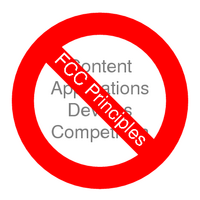
“Now is not the time, nor is this the appropriate proceeding, to engage in a debate about the need for net neutrality obligations,” two TWC lawyers warned the FCC on Monday. The discussion should stay strictly focused on broadband deployment, the company insists. “Debates in this proceeding about new net neutrality regulations would only divert attention from these important goals, delaying the distribution of funds while generating considerable contention when the Commission should instead be fostering a spirit of collaboration.”Matthew Lasar, writing in ars technica, makes a familiar point:

And one of them, Comcast, definitely thinks that the agency was way out of line to invoke this statement when sanctioning the company for P2P throttling last year, and has filed legal papers against the FCC in federal court. Expect arguments that the Commission never really properly established the declaration as a set of rules when the trial starts.Well, yeah, I’d expect to hear arguments like that, because the duopoly’s paid shills have been making them ever since the FCC made that toothless declaration of principles.
Yet it seems the Obama administration has taken the initiative to do what the FCC never did:
But the American Recovery and Reinvestment Act of 2009 has hard-wired the FCC’s pronouncement into law, at least when it comes to stimulus grantees. The legislation requires of grant recipients “at a minimum, adherence to the principles contained in the Commission’s broadband policy statement.” Plus the government must publish, in consultation with the Commission, “the non-discrimination and network interconnection obligations that shall be contractual conditions of grants awarded.”Still, why is Time Warner picking now to be so intransigent? And why is NCTA claiming FCC can’t interpret those principles, because

“Imposing new and untested nondiscrimination or interconnection requirements as a condition of stimulus funding risks injecting contentiousness, uncertainty, and delay into a process that should focus on creating new jobs and new broadband connections as quickly as possible,”While NCTA and TW are of course themselves injecting contentiousness, uncertainty, and delay into the process.
Hm, so if the current duopoly won’t accept these principles, the stimulus money may have to go to other companies. Which could mean the end of the duopoly.
The duopoly is playing chess with death.




